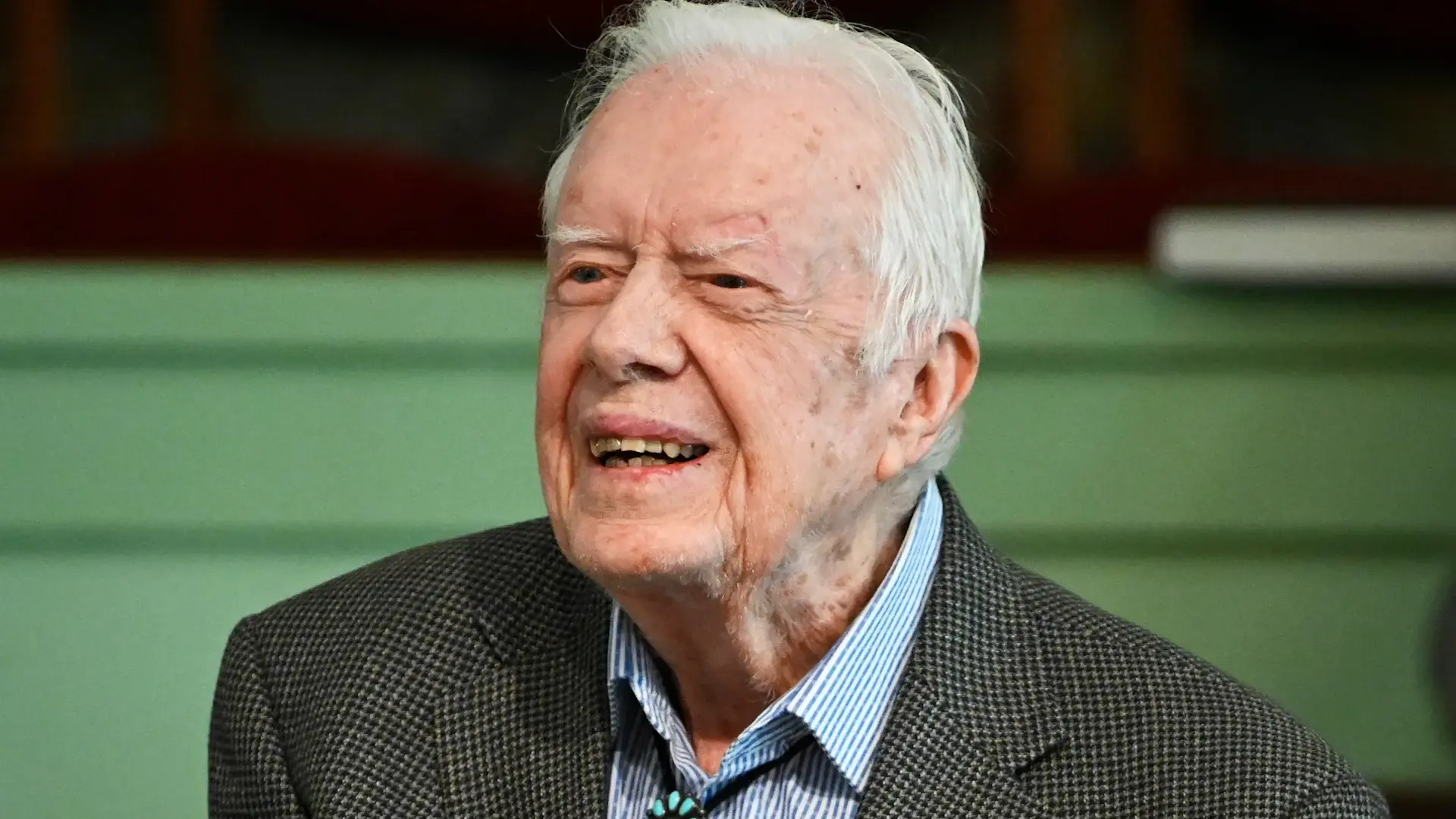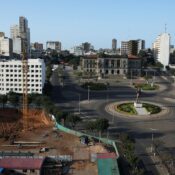
Jimmy Carter, the 39th president of the United States and renowned humanitarian, passed away
Jimmy Carter, the former president, passed away. He was more well recognized for his post-presidential humanitarian efforts than for his turbulent time in the White House. He was 100 years old.
The Carter Center said on Sunday that “our founder, former U.S. President Jimmy Carter, passed away this afternoon in Plains, Georgia.”
When the Nobel Peace Prize winner took over his father’s peanut warehouse business in 1961 and was just starting to think about a career in politics, he and his wife of 77 years, Rosalynn, also died in November 2023 in the small home they had created together.
He had declared in February 2023 that he was going into hospice care and discontinuing medical assistance.
“They are at peace and – as always – their home is full of love,” Jason Carter wrote on Twitter after visiting his grandparents at the time of the news.
The former president declared that he would vote for Vice President Kamala Harris in the 2024 presidential race, but he was at peace.
Jimmy Carter became one of the most resilient leaders in contemporary American politics after holding the office for just one term. He was the longest-serving former president in American history, having been evicted from the White House at the age of 56. In 2019, he overtook George H. W. Bush as the oldest ex-president still alive.
Despite a number of health issues in his last years, including a fight with brain cancer in 2015, Carter remained extraordinarily involved in humanitarian causes. In November 2019, after a series of falls that resulted in bleeding, he was admitted to Emory University Hospital in Atlanta for a treatment to relieve pressure on his head. He had broken his hip and needed surgery a few months prior, in May.
During his tenure in the White House from 1977 to 1981, Carter negotiated the historic Camp David peace agreements between Egypt and Israel, gave Panama ownership of the Panama Canal, significantly increased the area of public lands in Alaska, and established official diplomatic ties with the People’s Republic of China.
However, the 39th president presided over a period of skyrocketing inflation and gas shortages, and his inability to obtain the release of Americans who were being held captive by Iran contributed to the loss of his second term.
“As an American, he’s a giant, but he’s never going to be ranked as a great president; he’s middling as a president,” writes historian Douglas Brinkley, author of the 1998 book on Carter, “The Unfinished Presidency.”
Carter continued to work as an election observer in developing nations after losing his reelection bid to Ronald Reagan. He also taught Sunday school at the small Maranatha Baptist Church in Plains, Georgia, his hometown, and built houses through the nonprofit organization Habitat for Humanity until he was well into his 90s.
Twenty-two years after leaving the White House, he received the Nobel Peace Prize in 2002.
He laughed wryly as he told reporters, “I can’t deny that I was a better ex-president than I was a president,” during a breakfast in Washington in 2005.
“My former boss was humiliated when he lost in 1980; he felt he let himself and the American people down,” David Rubenstein, a former Carter White House worker who went on to founding the Carlyle Group and become a millionaire philanthropist, said USA TODAY in a 2019 interview.
“For a long time, he was basically the symbol of a weak president and a terrible person. And today, 40-some years later, he’s seen as a very incredible person who has had many good things he did, though he didn’t get reelected,” Rubenstein stated.
Nuclear submarines and peanut plantations
Earl Carter, a peanut warehouser who had previously served in the Georgia Legislature, and “Miss Lillian” Carter, a certified nurse and strong woman who enlisted in the Peace Corps when she was in her 60s, were the parents of James Earl Carter Jr., who was born in Plains on October 1, 1924.
He was raised on a Plains peanut plantation before earning his U.S. The Naval Academy. He served in the Atlantic and Pacific fleets of the Navy’s submarine service in the years following World War II. He became a pioneer in the use of nuclear power in submarines after completing graduate degree in nuclear physics.
Carter resigned his navy service after his father passed away in 1953, and he and Rosalynn, his local sweetheart, took over the family’s peanut farms. Following a difficult early period, the company prospered, and Carter got more involved in politics and community issues.
He established himself as an independent voice during his two terms in the Georgia state Senate, opposing wasteful government policies and assisting in the repeal of legislation intended to dissuade Black Americans from casting ballots.
However, in a 1966 election that some thought represented a Southern backlash against federal civil rights laws passed in 1964 and 1965, he lost to segregationist Lester Maddox in the contest for governor. Carter garnered support from certain segregationists and reduced his appearances in front of Black audiences during his second run for governor in 1970.
However, Carter was greeted as a symbol of a new, more inclusive South after he was elected, declaring that Georgia’s segregation was finished.
He was an improbable candidate for president, nevertheless. The former one-term governor was so unknown outside of the Peach State when he announced his intention to run for the Democratic nomination in 1976 that “Jimmy who?turned into a marketing cliche. He mastered the painstaking cultivation of Iowa voters, and his surprising win in the state’s first presidential caucuses served as a springboard that long-shot candidates attempted to follow for decades.
Carter’s chances were improved by the Watergate crisis. Carter positioned himself as an outsider who would reject Washington’s shady practices when President Richard Nixon chose to step down in 1974 rather than face impeachment. He assured them, “I will never tell lies to you.”
He nearly defeated President Gerald Ford in 1976, whose campaign was marred by turmoil surrounding his decision to pardon Nixon and by linguistic gaffes.
Carter himself would be removed four years later. Sen. Edward Kennedy of Massachusetts made a devastating bid for the Democratic candidacy, and Reagan defeated him handily in the general election on the right.
The former governor of California capitalized on dissatisfaction with Carter’s management style. “Have you improved since four years ago?Reagan posed this question to voters during the famous conclusion of their lone campaign debate.
Overshadowed by the accomplishments of the president?
Carter was a better president than most people realize, according to his supporters.
Stuart Eizenstat, an ambassador and seasoned Washington official who served as Carter’s top domestic policy adviser in the White House, stated, “I believe that he is the most underappreciated modern president that we’ve had.”
“The reason for that is the lingering memories of his presidency are negative ones – gasoline lines, high interest rates and inflation, the Iran hostage crisis, the Desert One failed rescue effort – and those totally obscure a really remarkable set of accomplishments both at home and abroad, which in many ways didn’t materialize until after he left office.”
According to Eizenstat, author of the 2018 book “President Carter: The White House Years,” Carter’s appointments and policies set the stage for a more robust economy, energy independence, environmental preservation, transportation industry innovation, and more.
Regarding foreign policy, Carter laboriously mediated the historic 1978 Camp David Accords between Menachem Begin of Israel and Anwar Sadat of Egypt, which resulted in a formal peace treaty between the two nations the following year.
Jimmy Carter: Compared to his predecessors, the media has been more critical of Trump.
However, he faltered when it came to the job’s politics.
Even though he had the benefit of a Congress that was firmly Democratic, many of his legislative proposals—including one that would have protected consumers—stalled. His strategy of not engaging in backroom dealings to gain the presidency made it harder for him to govern after he was in office. He was ridiculed for removing alcohol from the majority of nighttime parties and charging members of Congress for breakfast when they were asked to meet with him at the White House.
Some people viewed him as sanctimonious and prickly both then and later.
In the meantime, the powerful international energy cartel OPEC caused an oil crisis that left Americans in line to buy petrol, unemployment increased, and house mortgage interest rates reached double digits. Carter never used the term, but it became shorthand for his “malaise” address, which he used to describe a “crisis of confidence” among the American people in a July 1979 speech to the country.
“He lacked the political and managerial skills needed to make the best use of the office he held,” said Robert McClure, a political scientist at the Maxwell School of Citizenship and Public Affairs at Syracuse University.
The hostage situation has caused damage.
The Iranian hostage situation was the most detrimental.
The confrontation, which started on Nov. 4, 1979, would end only as Reagan was being inaugurated 444 days later. Iranian Islamist radicals overran the U.S. Embassy in Tehran and took 52 Americans hostage in protest after Carter agreed to allow Iran’s deposed shah, a former U.S. ally who was living in exile, to receive cancer treatment in the United States.
Carter froze Iranian assets in the United States, stopped oil imports from Iran, broke diplomatic ties with Iran, and put a complete economic embargo on the nation, opting for economic sanctions and diplomacy over military action.
Finally, he authorized a top-secret military operation to rescue the hostages, but it was a disaster: a helicopter and a plane collided while forces were being withdrawn, killing eight U.S. troops, and three helicopters experienced engine problems in a remote staging area in the Iranian desert, forcing the mission to be canceled.
All of this made it seem like Carter was in over his head.
Stephen Hess, a Brookings Institution scholar who served on Carter’s transition team as president-elect, said, “Carter was never able to overcome the bitter taste that the hostage crisis left in voters’ mouths.”
The hostages were released minutes after Carter’s successor took the oath of office on January 20, 1981, the day of Reagan’s inauguration, after Iran agreed to accept $8 billion in frozen assets and a pledge by the United States to relax trade sanctions in exchange for the hostages.
In 2002, former President Jimmy Carter received the Nobel Peace Prize.
A Nobel Peace Prize at last
Carter did not retire, but he did leave the White House.
He met with North Korean leaders to try to end its nuclear weapons program, mediated conflicts in Ethiopia, Liberia, Haiti, Bosnia, Sudan, Uganda, and Venezuela, led dozens of delegations of international observers to various countries to help ensure free and fair elections, and helped negotiate an end to the long civil war in Nicaragua between the Contra rebels and the Sandinistas. Jimmy and Rosalynn Carter founded the Carter Center in Atlanta, which served as their home base for decades as they worked on global health and democracy.
A devastating tropical disease that in 1986 affected an estimated 3.5 million people in Africa and Asia, the Carter Center also spearheaded an international campaign to eradicate Guinea worm disease for decades. By 2020, the disease was almost completely eradicated, with only 27 cases reported in six African countries.
The Carters worked as volunteers for Habitat for Humanity, a nonprofit organization that builds and renovates homes for underprivileged people worldwide, for a week every year.
He also published a collection of his poems and a collection of his paintings, and he wrote more than 30 books, including less controversial works on fly-fishing and Christmas memories and more controversial ones on the Middle East and Palestinian territories. He repeatedly wrote about the demands and lessons of his Christian faith.
In a speech at Liberty University, Carter makes fun of President Trump.
At times critical of the 45th president, Carter attended Donald Trump’s inauguration in 2017 and questioned the legitimacy of Trump’s election in June 2019 at a Carter Center conference in suburban Virginia, citing later-discredited claims of Russian meddling.
During a press conference, Trump retorted that Carter was a “nice man, terrible president.”
Carter did, however, occasionally seek out to Trump, and in 2019, on the 40th anniversary of the normalization of U.S.-China relations, he wrote to Trump with advise on how to manage that relationship. Carter said the resulting phone call was the first time the two men had ever spoken.
Five living former presidents will lead a disaster relief concert as part of their charitable endeavors.
The Nobel committee recognized Carter “for his decades of untiring effort to find peaceful solutions to international conflicts, to advance democracy and human rights, and to promote economic and social development.” In 2002, Carter received the Nobel Peace Prize that fans believed he had earned years earlier, when it had been given to Begin and Sadat.
When Carter accepted the prestigious prize, he said, “God gives us the capacity for choice. The bond of our common humanity is stronger than the divisiveness of our fears and prejudices.” We have the option to lessen suffering. We can decide to cooperate for peace. These are changes we can and should make.
Carter returned home to Plains after leaving the White House, and unlike most contemporary presidents, he did not opt to earn money by giving expensive speeches or sitting on corporate boards, but he did frequently address hundreds of guests who came to attend his Sunday school class at Maranatha Baptist Church.
He said to the crowd in November 2019 that he had no fear of dying.
Carter, who was 95 at the time, told them, “It’s incompatible for any Christian not to believe in life after death,” even though he admitted that he had struggled with uncertainties all of his life. “I didn’t ask God to let me live, but I just asked God to give me a proper attitude toward death,” he added in his prayers. And I discovered that I was totally OK with dying.
About 300 friends, family members, and fellow politicians, including Bill and Hillary Clinton, attended his and his wife’s 75th anniversary party in Plains in July 2021. Carter, displaying his frailty, made it a point to greet each guest at the table for what many of them believed would be their final encounter with him.
When Eizenstat visited Carter in Plains in 2018, Carter told his former aide that he was at ease with history making the final decision. “He was not a self-promoter in the White House or afterwards, and I think that hurt, because it leaves all the sour tastes from the failures and didn’t allow the positives to shine through,” Eizenstat said.
In an interview with USA TODAY, Carter reflected on his legacy as he neared his 90th birthday.
“One is peace,” he stated, adding that he worked to maintain peace while in office and that he attempts to foster peace between nations that may otherwise be at war, such as Israel and Egypt. human rights as well. … In addition to being a wonderful grandfather, I believe that the two things I want to be remembered for are human rights and peace.
All Categories
Recent Posts
Tags
+13162306000
zoneyetu@yahoo.com


